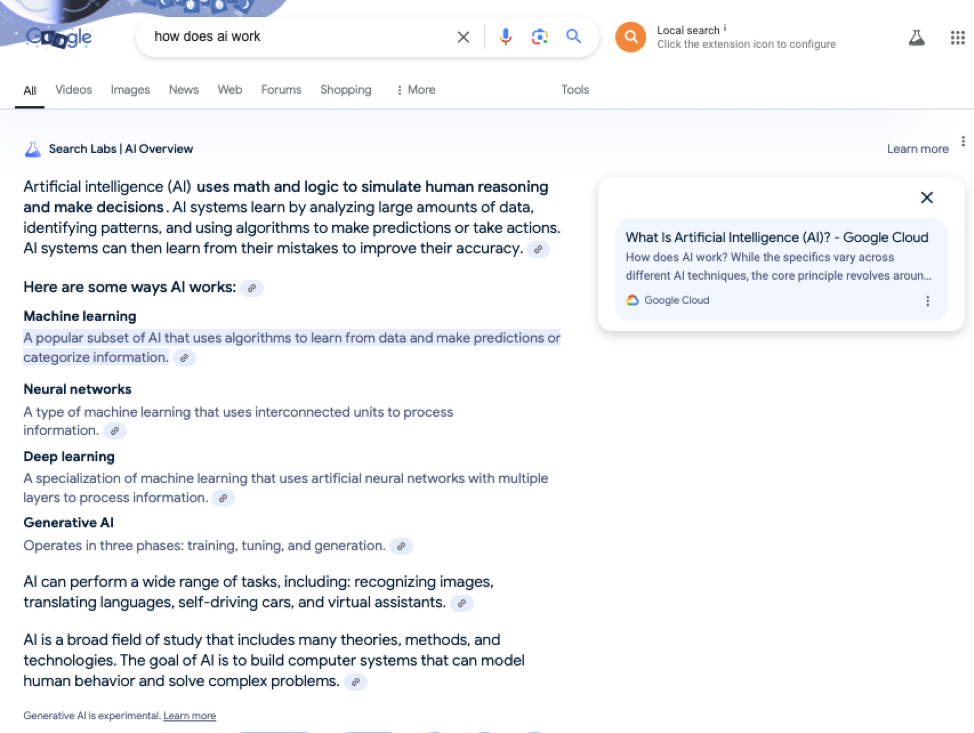AI has made it easier than ever to generate site content. With one query and a click, users can create blog posts, product descriptions, captions, and more. So how is this impacting Search Engine Optimization? Is AI-generated content just as valuable to Google’s algorithms as human-generated content? And how might AI Overviews impact CTRs? Let’s talk about how AI is changing SEO.
Did you know that automatically generated content is allowed by Google? As Google puts it, attempting to manipulate Search rankings by using AI-generated content is a violation of spam policies. But “not all use of automation, including AI generation, is spam.”
Google claims that it cares more about the quality of content than how it might have been produced. How does it determine quality, you may ask? Google uses a ranking system known as E-E-A-T, which stands for Expertise, Experience, Authoritativeness, and Trustworthiness. The Search engine looks for content that is useful, original, and otherwise satisfies these aspects of its ranking system.
How drastically AI content is going to shake up the SEO world is up for debate. Google claims that it has dealt with artificially-created content for years; AI is just the latest tool being used, for both pure and nefarious purposes. If SEO professionals want to use AI to generate truly helpful content, proponents argue that it’s a powerful tool to create meaningful content quickly.
Others might argue that, to some degree, AI relies on already-existing human-generated content. By design, it “learns” by analyzing existing data in order to generate “new” content. So if you want to create truly original content that will be recognized by Google as unique, pulling from your own unique experiences and perspective is more important than ever.
If you do use AI for SEO, it’s important that your brand’s distinct voice is not lost. Proofread for awkward language or misinformation. And always focus on quality over quantity.
You’ve probably noticed that Google Search now has AI Overviews, which are generative responses to user search queries that appear at the top of the Search results. At a glance, this may seem like a major blow to organic traffic. Users are no longer required to visit multiple websites for answers to certain queries; instead, they can read the AI-generated response that has already pulled information from a number of sources.
However, AI Overviews are not the end of the Internet’s need for engaging organic content. In fact, these Overviews use a variety of sources, and, importantly, they cite the sources they are pulling from. If your SEO efforts have historically put you at the top of the Search results for a certain query, there’s a good chance that your site is still being placed at the top of the results as a part of AI Overviews.
In the same way that a meta description might give users an idea of an answer to a query before clicking on a website, so too does an AI Overview give users a glimpse of your website’s take on an issue. If users want to know more, they can click on the link to your site, gaining additional context around the issue.

It’s also worth noting that AI Overviews are still less than perfect, and many users will likely continue to peruse the traditional Search results in order to confirm the validity of the claims of the AI Overview.
Not only is Google summarizing Search results with AI, but it is also using AI to rank those results. However, you may be surprised to know that Google has actually been using AI to rank Search results for years.
RankBrain was Google’s first AI system, and was introduced in 2015. Since then, Google has introduced a number of other AI-powered systems to help the search engine determine what it should rank for specific queries. While these different systems may have different primary functions, the ultimate goal is to recognize the intent behind a search, beyond just what is written.
With this in mind, your site’s content should be driven by user needs. Avoid keyword stuffing, and consider all the different phrases that users might search to learn about a topic, rather than focusing on a single keyword per page. Remember the human behind the search, and your SEO efforts will never be outdated.
--
AI continues to take the world by storm, and it’s important to know how this and future technology might impact your SEO efforts. By signing up for our newsletter, we’ll keep you up-to-date on all the latest marketing trends. Or, contact us today to learn more about our SEO services.